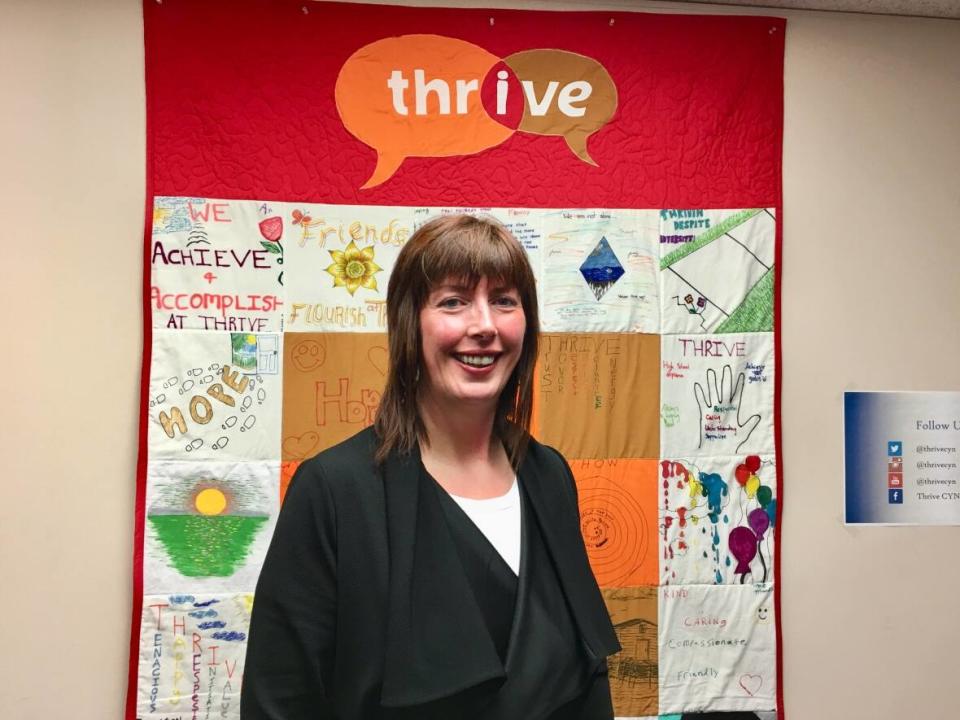Sexual exploitation survivors could soon find themselves with nowhere to turn, Thrive director warns

A program that has helped dozens of sexual exploitation survivors in Newfoundland and Labrador rebuild their lives is at risk of ending permanently, its director says.
The Blue Door program, run by St. John's-based non-profit Thrive, started five years ago with the help of funding from Ottawa.
That five-year contract, supplying cash to the tune of $450,000 a year, draws to a close in February.
Director Angela Crockwell, in a phone interview Tuesday, said staff were already steadying themselves for the worst.
"I am incredibly concerned," Crockwell said gravely. Nearly 50 clients now use the Blue Door's therapy services, and receive intensive help from staff to apply for income support, write resumés and find shelter.
Even just the basics, like securing dinner on any given day, can represent an overwhelming hurdle for somebody trying to escape sexual exploitation or leave the sex trade, Crockwell said.
She's now scrambling for a backup plan.
"We have to try to figure out where we can get them some level of support," she said. "The truth is, I don't even know where we would find that capacity in the community."
Crockwell says she sent a letter in mid-October requesting yearly funding of $417,000 to Premier Andrew Furey's office and the departments of Health, Social Development, Justice, and Women and Gender Equality. The money would pay for a psychotherapist on contract, four salaries for the program's staff, office fees and flexible funds for food, transportation and other incidentals for the program's clients.
She said none of the respondents has offered her a funding commitment to date.

CBC News asked for comment from the premier's office and the four government departments copied on Thrive's letter. The Department of Women and Gender Equality responded on behalf of the province, sending an emailed statement calling the Blue Door program "meaningful."
"We are committed to working with our community partners to help ensure the safety and well-being of those working in the industry and those who seek to exit the industry," the statement said.
"We will continue to seek innovative solutions both across provincial government departments and from other funding sources to support this important work."
The statement did not contain an explicit commitment to fund the Blue Door program.
'I don't know where they're going to go'
Without the funding, Crockwell says, the program will end.
"The idea is that if it was proven to be beneficial and produce the outcomes, then hopefully that the province would pick it up," Crockwell said.
She pointed to data she sent to government officials, showing that 63 per cent of the 80 clients who sought help from Blue Door now have employment outside the sex trade. Five of them are in university or college.
"The fact that we have maintained a wait-list for five years means there's a demand for it," she said.
"And I feel really strongly that as a province, we have an obligation to make sure that people who've had this experience have access to the appropriate supports and services to rebuild their lives."
Exploitation and trafficking in Newfoundland and Labrador doesn't look like Hollywood's depiction, she explained. Sometimes survivors are coerced into participating in sexual activities for food or shelter, or forced into the sex trade by family.
Nearly half of Thrive's clients are under 25 years old, she said.
Like those who've experienced intimate partner violence or sexual assault, survivors of sexual exploitation require specialized services, she added.
"It's the only program of its kind," Crockwell said.
And if it closes?
"Honestly, I don't know where they're going to go."

